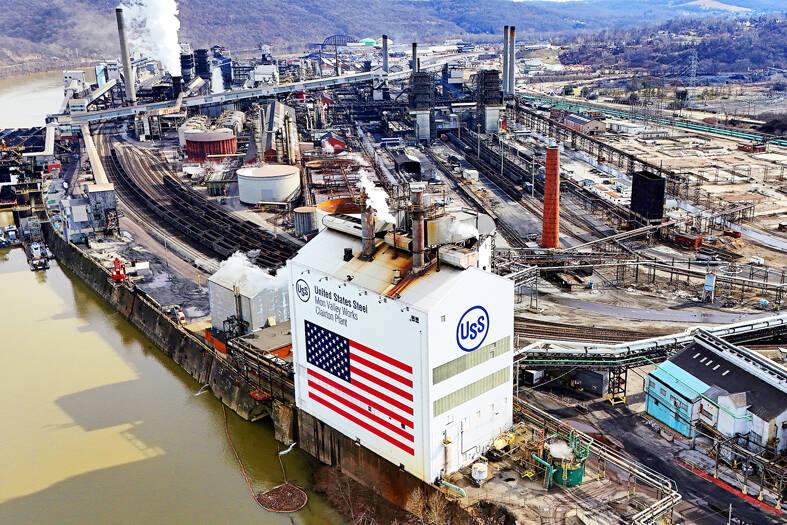Two US steel-state Democrats in tough re-election fights are urging US President Joe Biden to do more to stop the proposed acquisition of United States Steel Corp by Japan-based Nippon Steel Corp.
“We’re pushing the White House on national security grounds and on trade enforcement,” US Senator Sherrod Brown of Ohio told Bloomberg Television. “And fundamentally what this means for American workers and American jobs.”
United States Steel shareholders on Friday voted in favor of the US$14.1 billion takeover offer by Nippon Steel, even though Biden has publicly opposed the takeover and said the company should be US-owned.

Photo: AP
The Biden administration is putting the deal through a secretive national security review process, one that is typically reserved for businesses involving adversarial nations rather than allies like Japan. The decision by the Committee on Foreign Investment in the US could be contested in court.
The US Department of Justice also opened an extended antitrust investigation into the takeover, creating additional hurdles to closing the deal. As a result, the companies are considering delaying the expected deal timeline.
Brown’s Senate race is considered one of the most competitive contests this November, and appealing to industrial workers is key to his re-election hopes. US Steel went against the request of the steelworkers union, which would have preferred the Ohio-based Cleveland-Cliffs Inc mining company make the acquisition.
Democratic US Senator Bob Casey, facing a competitive re-election in next-door Pennsylvania, where US Steel is headquartered in Pittsburgh, also is championing the cause.
“My principal concern is those steelworker jobs and this deal gives me great concern about the threat to those jobs,” Casey told Bloomberg Television.
Casey said he is inquiring with the White House about how conflict over the acquisition was handled in Biden’s discussions with Japanese Prime Minister Fumio Kishida during his state visit last week.
When asked about the takeover at a joint news conference with Kishida, Biden reiterated his promise to back the United Steelworkers Union in its opposition to the deal.
Presumptive Republican presidential nominee Donald Trump also has said he would try to block the deal if elected.
Nippon Steel in December last year agreed to buy US Steel at a significant premium, saying the deal would make the US steel industry more competitive.

Micron Memory Taiwan Co (台灣美光), a subsidiary of US memorychip maker Micron Technology Inc, has been granted a NT$4.7 billion (US$149.5 million) subsidy under the Ministry of Economic Affairs A+ Corporate Innovation and R&D Enhancement program, the ministry said yesterday. The US memorychip maker’s program aims to back the development of high-performance and high-bandwidth memory chips with a total budget of NT$11.75 billion, the ministry said. Aside from the government funding, Micron is to inject the remaining investment of NT$7.06 billion as the company applied to participate the government’s Global Innovation Partnership Program to deepen technology cooperation, a ministry official told the

Taiwan Semiconductor Manufacturing Co (TSMC, 台積電), the world’s leading advanced chipmaker, officially began volume production of its 2-nanometer chips in the fourth quarter of this year, according to a recent update on the company’s Web site. The low-key announcement confirms that TSMC, the go-to chipmaker for artificial intelligence (AI) hardware providers Nvidia Corp and iPhone maker Apple Inc, met its original roadmap for the next-generation technology. Production is currently centered at Fab 22 in Kaohsiung, utilizing the company’s first-generation nanosheet transistor technology. The new architecture achieves “full-node strides in performance and power consumption,” TSMC said. The company described the 2nm process as

Shares in Taiwan closed at a new high yesterday, the first trading day of the new year, as contract chipmaker Taiwan Semiconductor Manufacturing Co (TSMC, 台積電) continued to break records amid an artificial intelligence (AI) boom, dealers said. The TAIEX closed up 386.21 points, or 1.33 percent, at 29,349.81, with turnover totaling NT$648.844 billion (US$20.65 billion). “Judging from a stronger Taiwan dollar against the US dollar, I think foreign institutional investors returned from the holidays and brought funds into the local market,” Concord Securities Co (康和證券) analyst Kerry Huang (黃志祺) said. “Foreign investors just rebuilt their positions with TSMC as their top target,

POTENTIAL demand: Tesla’s chance of reclaiming its leadership in EVs seems uncertain, but breakthrough in full self-driving could help boost sales, an analyst said Chinese auto giant BYD Co (比亞迪) is poised to surpass Tesla Inc as the world’s biggest electric vehicle (EV) company in annual sales. The two groups are expected to soon publish their final figures for this year, and based on sales data so far this year, there is almost no chance the US company led by CEO Elon Musk would retain its leadership position. As of the end of last month, BYD, which also produces hybrid vehicles, had sold 2.07 million EVs. Tesla, for its part, had sold 1.22 million by the end of September. Tesla’s September figures included a one-time boost in